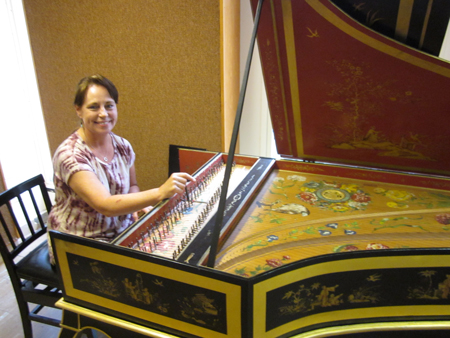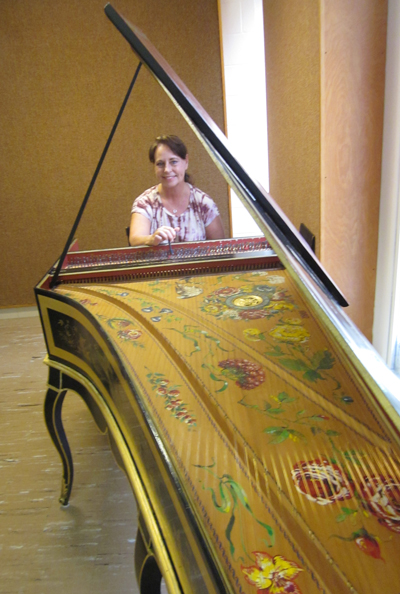by Daniel Hathaway

Few other institutions could provide multiple practice instruments for that many keyboardists. BPI students have access to 18 harpsichords of various configurations, and Stewart tunes them all every weekday beginning between 6:00 and 6:30 am. “In ten days, that comes out to 180 tunings, plus another 20 for concerts and faculty rehearsals,” she told me, taking a break from touching up one of Lisa Goode Crawford’s personal instruments.
On Saturdays, during marathon student ensemble concerts, Stewart said she tunes the Kulas Hall instrument in the morning, again at 1 pm, then during each of the two intermissions. She used to be even busier at BPI, tuning in the mornings and teaching Baroque flute class in the afternoons.
“The first couple of days are really rough because the instruments have been moved out of their normal spots, so they have to get adjusted. That usually takes several hours, and by the end of that period my ears are tired,” she said. “But by the middle of the first week, all of them had calmed down, and I’m basically just doing a daily touch-up.”
Oberlin’s fleet of plucked keyboard instruments just received a fresh infusion from a donor in Texas, a collection that included five harpsichords, a clavichord, a virginal, and a clavierorganum — a copy of a 16th century hybrid instrument. The gift included a baby blue harpsichord, a copy by John Phillips of an Italian instrument by Giusti that was used last week by Joseph Gascho for his recital with Julie Andrijeski.
“It’s a sweet little thing, really cute,” Stewart said, although its move to Fairchild Chapel and climatic conditions made tuning a challenge. “The chapel was hot. We opened windows, but then the weather outside was what we got inside. I tuned right before the performance and hoped for the best.”

Besides tuning the instruments, Kathie Stewart gets into some fix-it situations — mainly replacing quills and strings. “This is day four,” she said when I spoke with her, “and I haven’t broken a string yet.” Although the plectra that pluck Oberlin’s harpsichord strings are usually made of composites like Delrin or Celcon, there are instruments in the collection that use the old-fashioned method: bird quills. “I go to the reservoir in Wellington to collect Canada goose quills,” Stewart said, “and I have friends who also keep an eye out for cast-off feathers.”
How did Stewart get into this business in the first place? “It’s Jeannette Sorrell’s fault,” she said, explaining that the harpsichordist who went on to found Apollo’s Fire once worked as Oberlin’s harpsichord tuner. “Years ago, when I first moved to the area, I didn’t have a job and Jeannette needed help. She showed me how to set a temperament, and along with a student I started tuning for eight hours a week. When Jeannette moved to Cleveland and the student graduated, I took over the job.”
During the school year, Stewart teaches a fall class of four students who learn how to tune. Each get their own instrument to work with in the second term. “Usually a star emerges from the group. A couple of years ago, it was Albert Bellefeuille, who has become my official assistant. He’s busy at BPI carrying harpsichords around, but he’ll tune for the second Saturday student recital because I have a concert with Apollo’s Fire.”
Published on ClevelandClassical.com June 29, 2017.
Click here for a printable copy of this article


